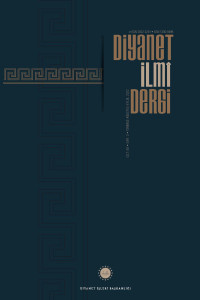FUTURE CONTINGENT PROPOSITIONS AND FREE WILL: AL-RÂZÎ’S CRITICISM ON ARISTOTLE’S SOLUTION OF THE LOGICAL FATALISM
Abstract
Keywords
Fakhr al-Din al-Râzî Aristoteles logical fatalism free will sea-battle contingent propositions.
Project Number
yok
References
- Adamson, Peter. “The Arabic Sea Battle: al-Farabi on the Problem of Future Contingents”. Archiv für Geschichte der Philosophie 88/2 (2006), 163-188.
- Aristoteles. Categories and De Interpretatione. çev. J. L. Ackrill. New York: Oxford University Press, 1963.
- Craig, W. L. Time and Eternity: Exploring God’s Relationship to Time. Wheaton, Illinois: Crossway Books, 2001.
- Çiçekdağı, Caner. “Aristoteles’in Peri Hermeneias (Yorum Üzerine) Eserinin 9. Bölümü Üzerine Bir Yorum Denemesi: ‘Geleceğe Ait Olumsal Önermeler’” 4/8 (2015), 23-61.
- Fârâbî, Ebû Nasr el-. Kitâbü’l-İbâre. Mısır: Matbaatü Dârü’l-Kütüb, 1976.
- Hintikka, Jaakko. “The Once and Future Sea Fight: Aristotle’s Discussion of Future Contingents in De Interpretatione IX”. The Philosophical Review 73 (1964), 461-492.
- İbn Rüşd. Telhîsu Kitâbi’l-ibâre. ed. Mahmud Kasım. Kahire: Merkezü’l-Buhûsi’l-Emrîkî bi-Mısr, 1981.
- İbn Sînâ. Yorum Üzerine: İbâre. çev. Ömer Türker. İstanbul: Litera Yayıncılık, 2006.
- Karaismail, Fatma. Fahrettin er-Râzî’nin Önerme Anlayışı. İstanbul Üniversitesi Sosyal Bilimler Enstitüsü: İstanbul Üniversitesi, Doktora, 2022.
- Râzî, Fahreddin. Ana Meseleleriyle Kelam ve Felsefe: el-Muhassal. çev. Eşref Altaş. İstanbul: Klasik, 2019.
- Râzî, Fahreddin. el-Metâlibü’l-âliye mine’l-ilmi’l-ilâhî. 9 Cilt. Beyrût: Dârü’l-Kitâbi’l-Arabî, 1987.
- Râzî, Fahreddin. Mantıku’l-Mülahhas. ed. Ahad Ferâmurz Karameleki - Âdîne Asgarînejad. Tahran: Dânişgâh-ı İmâm Sâdık, 1381.
- Râzî, Fahreddin. Şerhu Uyûni’l-hikme. 3 Cilt. Tahran: Müessesetü’s-Sâdık, 1373.
- Râzî, Fahreddin. Şerhu’l-İşârât ve’t-tenbîhât. ed. Ali Rızâ Necefzâde. 2 Cilt. Tahran: Encümen-i Âsâr ve Mefâhir-i Ferhengi, 2005.
- Rice, Hugh. “Fatalism”. Stanford Encyclopedia of Philosophy (Winter 2018 Edition). ed. Edward N. Zalta. Erişim 15 Mayıs 2022. https://plato.stanford.edu/entries/fatalism/#1.2
- Whitaker, C. W. A. Aristotle’s De İnterpretatione, Contradiction and Dialectic. New York: Oxford University Press, 1996
GELECEKLE İLGİLİ MÜMKÜN ÖNERMELER VE ÖZGÜR İRADE: FAHREDDİN ER-RÂZÎ’NİN ARİSTOTELES’İN MANTIKSAL KADERCİLİK ÇÖZÜMÜNE YÖNELİK ELEŞTİRİLERİ
Abstract
Keywords
Fahreddin er-Râzî Aristoteles Mantıksal Kadercilik Özgür İrade Deniz Savaşı Mümkün Önermeler.
Supporting Institution
yok
Project Number
yok
Thanks
yok
References
- Adamson, Peter. “The Arabic Sea Battle: al-Farabi on the Problem of Future Contingents”. Archiv für Geschichte der Philosophie 88/2 (2006), 163-188.
- Aristoteles. Categories and De Interpretatione. çev. J. L. Ackrill. New York: Oxford University Press, 1963.
- Craig, W. L. Time and Eternity: Exploring God’s Relationship to Time. Wheaton, Illinois: Crossway Books, 2001.
- Çiçekdağı, Caner. “Aristoteles’in Peri Hermeneias (Yorum Üzerine) Eserinin 9. Bölümü Üzerine Bir Yorum Denemesi: ‘Geleceğe Ait Olumsal Önermeler’” 4/8 (2015), 23-61.
- Fârâbî, Ebû Nasr el-. Kitâbü’l-İbâre. Mısır: Matbaatü Dârü’l-Kütüb, 1976.
- Hintikka, Jaakko. “The Once and Future Sea Fight: Aristotle’s Discussion of Future Contingents in De Interpretatione IX”. The Philosophical Review 73 (1964), 461-492.
- İbn Rüşd. Telhîsu Kitâbi’l-ibâre. ed. Mahmud Kasım. Kahire: Merkezü’l-Buhûsi’l-Emrîkî bi-Mısr, 1981.
- İbn Sînâ. Yorum Üzerine: İbâre. çev. Ömer Türker. İstanbul: Litera Yayıncılık, 2006.
- Karaismail, Fatma. Fahrettin er-Râzî’nin Önerme Anlayışı. İstanbul Üniversitesi Sosyal Bilimler Enstitüsü: İstanbul Üniversitesi, Doktora, 2022.
- Râzî, Fahreddin. Ana Meseleleriyle Kelam ve Felsefe: el-Muhassal. çev. Eşref Altaş. İstanbul: Klasik, 2019.
- Râzî, Fahreddin. el-Metâlibü’l-âliye mine’l-ilmi’l-ilâhî. 9 Cilt. Beyrût: Dârü’l-Kitâbi’l-Arabî, 1987.
- Râzî, Fahreddin. Mantıku’l-Mülahhas. ed. Ahad Ferâmurz Karameleki - Âdîne Asgarînejad. Tahran: Dânişgâh-ı İmâm Sâdık, 1381.
- Râzî, Fahreddin. Şerhu Uyûni’l-hikme. 3 Cilt. Tahran: Müessesetü’s-Sâdık, 1373.
- Râzî, Fahreddin. Şerhu’l-İşârât ve’t-tenbîhât. ed. Ali Rızâ Necefzâde. 2 Cilt. Tahran: Encümen-i Âsâr ve Mefâhir-i Ferhengi, 2005.
- Rice, Hugh. “Fatalism”. Stanford Encyclopedia of Philosophy (Winter 2018 Edition). ed. Edward N. Zalta. Erişim 15 Mayıs 2022. https://plato.stanford.edu/entries/fatalism/#1.2
- Whitaker, C. W. A. Aristotle’s De İnterpretatione, Contradiction and Dialectic. New York: Oxford University Press, 1996
Details
| Primary Language | Turkish |
|---|---|
| Subjects | Philosophy, Religious Studies |
| Journal Section | Research Article |
| Authors | |
| Project Number | yok |
| Publication Date | September 15, 2022 |
| Submission Date | May 21, 2022 |
| Published in Issue | Year 2022 Volume: 58 Issue: 3 |
Diyanet İlmi Dergi is licensed under a Creative Commons Attribution-NonCommercial 4.0 International License (CC BY NC).

